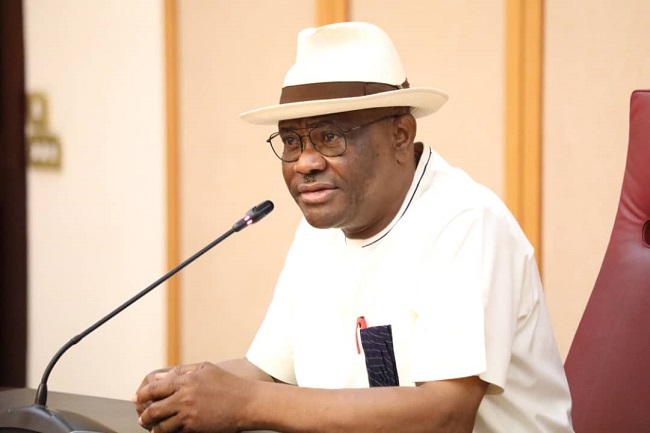Rivers State Governor, Chief Nyesom Wike has said President Muhammadu Buhari’s complaint that Section 84 (12) of the Electoral Act, 2022 would disenfranchise serving political office holders was selfish and not altruistic.
The governor said if Buhari truly believes in transparent election and that everybody should have a level playing ground, he would not be suggesting the amendment of the section, which he claims would disenfranchise serving political office holders from voting or being voted for at conventions or congresses of any political party.
Wike stated this in Port Harcourt, last Friday while reacting to Buhari’s assent to the Electoral Act Amendment Bill.
He noted that the president’s complain that Section 84 (12) was ultra vires with the 1999 Constitution as amended, was neither here nor there.
“Mr President has told the world he is trying to protect some of his appointees who want to run election, and who are afraid of leaving office knowing fully well that having left the office it would be difficult for them to assert or to influence the outcome of party primaries.
“If Mr President really believes in free, fair and transparent election, and for everybody to have a level playing ground, Mr President will not call for such amendment.”
Wike observed that Buhari was not willing to sign the Electoral Act Amendment Bill into law, but had to succumb to pressure mounted on him by Nigerians.
According to him, if the president had declined assent on the bill, the National Assembly would have been embarrassed and lost public confidence.
“For whatever it is worth, let us say Nigerians are happy that after all said and done, the president and the APC administration, for the first time, have bowed to pressure of Nigerians in order to have a law that enables our electoral process to be transparent. But again, this tells you the kind of party in power.”
The Rivers State governor stated that the emotions and tensions created in the polity by Buhari’s delay to assent to the Electoral Act Amendment Bill was unnecessary, particularly when Nigerians and those whom he claim would be disenfranchised have not complained about provisions of the bill.
Wike said Buhari should allow ministers, commissioners, special advisers who feel the provision of the Electoral Act would adversely affect them to proceed to court and challenge it.
“Mr President knows the function of the Legislature is to make laws. The function of the Executive is to implement the law, and the function of the Judiciary is to interpret the law. Now, Mr. President is not only doing the work of the Executive, he has also delved into the work of the Judiciary of interpreting the law, knowing where there is conflict. I wonder why Mr President didn’t know when he appended his signature to the Police Trust Fund that it was in conflict with the provision of the Constitution.”
Wike said one remarkable feature of the Electoral Act was that it would reduce the involvement of security agencies in the hijacking of ballot boxes and results.
He said the new law would also make public officers seeking re-election to be on their toes because their political fate would be solely determined by the electorate based on their performance.
Wike commended the National Assembly for granting Independent National Electoral Commission (INEC) the power to transmit election results electronically and reject results that were issued under duress.
“Electronic transmission of results will give confidence to the people to the electorate and anybody who is elected will now sit up to say it is not going to be business as usual.”
Some of the 10 key provisions of the new Electoral Act as signed by Buhari include Clause 29(1), which stipulates that parties must conduct primaries and submit their list of candidates, at least, 180 days before the general election; and Clause 65, which states that INEC can review results declared under duress.
The rest are Clause 3(3), which states that funds for general elections must be released at least one year before the election; Clause 51, which says that the total number of accredited voters will become a factor in determining over-voting at election tribunals; and Clause 54(2), which makes provisions for people with disabilities and special needs.
Clause 47 gives legislative backing for smart card readers and any other voter accreditation technology that the Independent National Electoral Commission (INEC) deploy; Clause 34 gives political parties power to conduct a primary election to replace a candidate who died during an election; and Clause 50 gives INEC the legal backing for electronic transmission of election results.
Also, Clause 94 allows for early commencement of the campaign season. By this provision, the campaign season will now start 150 days to the Election Day and end 24 hours before the election; while Clause 84 stipulates that anyone holding a political office – ministers, commissioners, special advisers and others – must relinquish the position before they can be eligible to participate in the electoral process either as a candidate or as a delegate.
previous post

